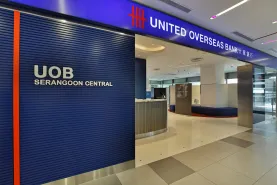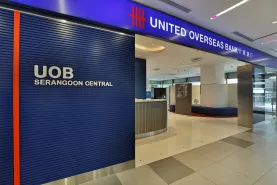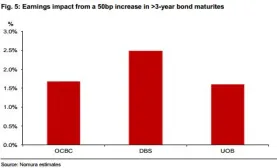Singapore
Why Moody's recent woe about Singapore banks isn't alarming news
Why Moody's recent woe about Singapore banks isn't alarming news
Actually, there's a bigger problem ahead.
Why DBS' failed Danamon bid is not a 'crippling' issue
But drawbacks are still challenging.
Major senior management reshuffle at MAS
Shake-up aimed at strengthening the central bank’s leadership.
Analyst worried over UOB's property exposure
Housing loans account for 28% of UOB’s portfolio.
RMB offshoring gathers pace
Over the past couple of years, the issuance of offshore RMB bonds has soared, with levels expected to reach the equivalent of 360 billion yuan this year. To address the growing interest from international investors, a number of markets - in particular Taiwan and Singapore - have established offshore RMB centres in an attempt to capture a share of this lucrative business.
1 in 3 Singaporean finance professionals see wealth management as path to success
Best way to begin career in banking and finance.
Looking at Asian companies' transaction banking relationships from a historical perspective
They want more than commoditised service.
An over-engineered finance industry has gone too far
The other day I conducted a simple statistical experiment. I calculated the “value-at-risk” exposure for an hypothetical investment portfolio consisting of just one bond holding.
Guess what are the big boosters in Singapore banks' laudable 2Q report
Loan growth exceeded expectations.
This is what dragged down OCBC's 2Q13 profit by 14%
Unrealized MTM losses are to blame.
Singapore sovereign wealth fund ready to invest more
GIC is the world's fourth largest sovereign wealth fund.
Singapore banks' system loan growth dips to 9.6% in June
What could be the reasons behind it?
UOB's mortgage growth rate feared to collapse to 5% in 2014
ven group loan growth could slow.
Legal principles to watch out for in trade credit insurance
In my last article, I wrote about Trade Credit Insurance (TCI) and its usefulness.
Here's how Singapore banks will be affected by a 50bp increase in 3-year bond maturites
Guess which bank will benefit the most?
3 things everyone must look out for in OCBC's 2Q13 results
Will there be further margin contraction?
Find out more about the ambitious 2015 Asia strategy of SWIFT's new deputy chief executive for Asia Pacific
Patrick de Courcy shares his 3 goals following his appointment.














 Advertise
Advertise

















Commentary
Asia’s banks hold the mandate to innovate. Now they must earn it.
Why Asia's banks are rebuilding their credit infrastructure in 2026
Banks retreat, private credit advances: Asia Pacific’s quiet lending revolution
Human Sparsity Blockchain: A citizen-validated ledger for digital finance supervision
Will stablecoins disrupt the banking business?
Digital transformation starts with leadership